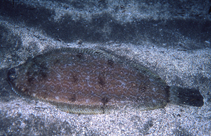| Family: |
Soleidae (Soles) |
| Max. size: |
40 cm SL (male/unsexed) |
| Environment: |
demersal; marine; depth range 20 - 250 m |
| Distribution: |
Eastern Atlantic: Portugal southward to Senegal; a single record from southwest of the British Isles; Mediterranean: Spain, Algeria and Turkey. |
| Diagnosis: |
Dorsal soft rays (total): 71-86; Anal soft rays: 58-68; Vertebrae: 40-43. Body oval; upper eye less than its own diameter from dorsal profile of head; anterior nostril on blind side not enlarged; anterior nostril on eyed side with a backward-pointing tube hardly reaching to front border of lower eye; dorsal fin beginning near vertical through front border of upper eye; pectoral fin on eyed side with 6-8 fin rays, on blind side shorter; caudal fin separate from last dorsal and anal fin rays; lateral line supra-temporal branch forming an angular S-shape, the ascending part running upward and backward (Ref. 4710). |
| Biology: |
Found on mud and sand of the continental shelf, from the shore down to 250 m (Ref. 4710). Feeds on small benthic invertebrates, mainly amphipods and polychaetes (Ref. 4710). Minimum depth range from Ref. 121791. |
| IUCN Red List Status: |
Data deficient (DD); Date assessed: 15 July 2014 Ref. (130435)
|
| Threat to humans: |
harmless |
Source and more info: www.fishbase.org. For personal, classroom, and other internal use only. Not for publication.

